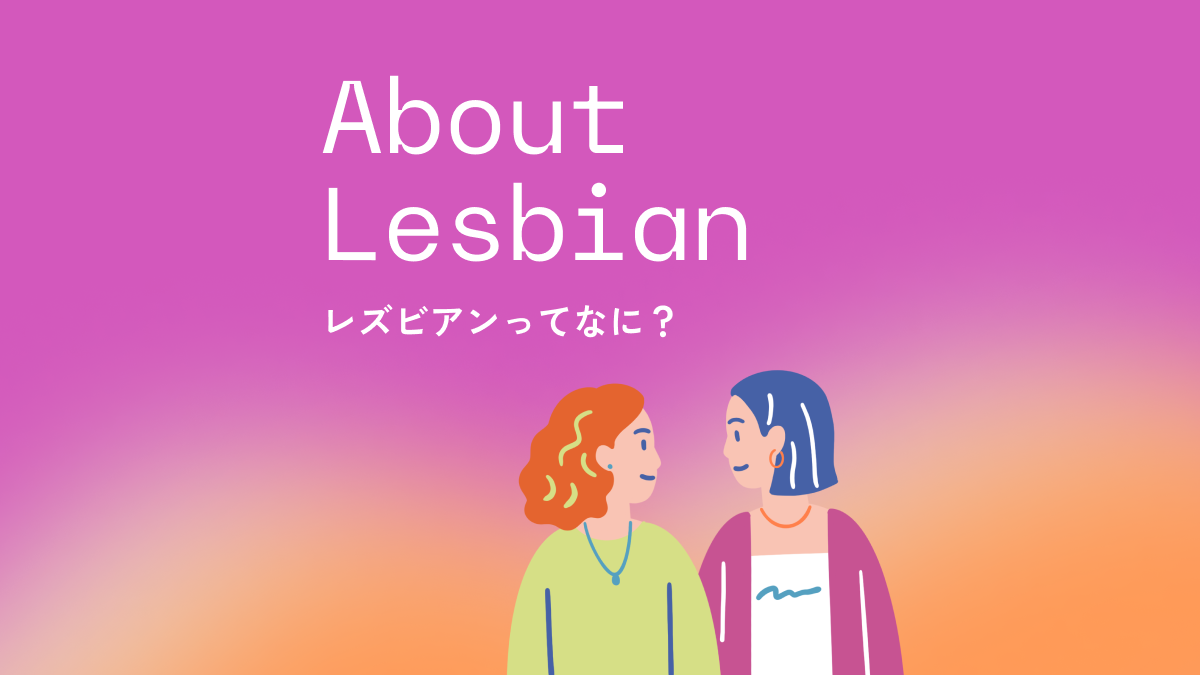What Is a Lesbian?

Even though we are hearing more about LGBTQ+ these days, there still are not that many chances to really learn about each kind of sexuality.
For example, when it comes to lesbians — the “L” in LGBTQ+ — you might think, “I kind of know what a lesbian is,” but maybe that idea is actually based on a simple or stereotyped image from the media.
In this article, we will explain from the basic question “What does “lesbian” mean?” Additionally, we will also explain what words should be avoided, and common misunderstandings and biases.
What Does “Lesbian” Mean?
A lesbian is a person who is a woman, and who feels sexual, romantic, or emotional attraction — one, some, or all of these — towards other women.
To say it more simply, “lesbian” is a label that includes women who are attracted to women (same-gender attracted women).
However, not all women who are attracted to women call themselves lesbians. For example, some people call themselves “gay” or “gay women.”
Note: In Japan, the word “gay” is mostly used for men who are attracted to men, but in English-speaking countries, it can also be used for women who are attracted to women.
How someone talks about their sexuality is up to them. We should not decide for someone else and say they are a “lesbian.”
Is It Okay to Say “Lezu”?
“Lezu(レズ)” is a shortened form of the word “lesbian” in Japanese. Even today, some people still say it in Japan, and many may use it without meaning any harm, thinking it is just a shorter version.
But the word “lezu” has been used in a hurtful, discriminatory way toward lesbians. That is why “lezu” is a word we should avoid using.
It is true that some people in the community use the word “lezu” to talk about themselves. Sometimes, it is also used in a friendly way within the lesbian community.
However, just because someone uses a word for themselves — even if it is a word that is often seen as a slur — that does not mean others can use it too.
Even if one person does not feel bad being called a certain name, that does not mean everyone else feels the same way. In fact, many people feel hurt when someone else calls them “lezu.”
Also, there is a big difference between “self-labeling” (how someone talks about themselves) and “other-labeling” (how someone else talks about them). Sometimes, people in the community choose to use a word that was once used to hurt them, as a way of saying: “We won’t let the majority decide who we are.”
For these reasons, Palettalk chooses not to use the word “lezu.”
Misunderstandings and Biases About Lesbians
In movies and TV shows, we are starting to see more characters who are lesbians. But still, it is true that there are many simple, one-sided images about lesbians, and that discrimination, misunderstandings, and biases are spreading.
Below, we will explain some common misunderstandings and biases about lesbians.
“Do you like any woman?” “Don’t try to hit on me.”
Sexual orientation means the kind of people someone might feel attracted to. Just like straight people do not like every person of a different gender, lesbians do not like every woman just because they are women.
“She became a lesbian because men didn’t like her / because she doesn’t know how great men are”
A person’s sexuality is not decided because they gave up on something, or because they did not have enough experience. Sexuality can change over time, but it is not something people can just “choose” whenever they want. Also, some people wrongly think “lesbians = hate men,” but think about it like this: Do straight people like the other gender because they hate their own gender? Of course not.
“Women in same-gender relationships don’t do anything sexual”
This comes from the idea that “Women are not active in sexual matters,” and from turning lesbian relationships into something overly dreamy or unrealistic. Whether or not a couple has sex in their relationship depends on their own choices, values, and relationships— just like straight couples. And of course, saying “a relationship is only real if there is sex” is also wrong.
Summary
In this article, we introduced the meaning of the word “lesbian” and some common biases people have.
April 26 is Lesbian Visibility Day. And this year, April 21–28 is Lesbian Visibility Week, which includes the day.
Lesbian Visibility Week is a week to celebrate lesbians, and also to show support for all LGBTQ+ women and non-binary people.
At Palettalk, we will be sharing content on the theme of Lesbian Visibility Week for the next two weeks, starting today.
Why not take this chance to learn together?
References
https://glaad.org/reference/terms/
https://www.lesbianvisibilityweek.com/
